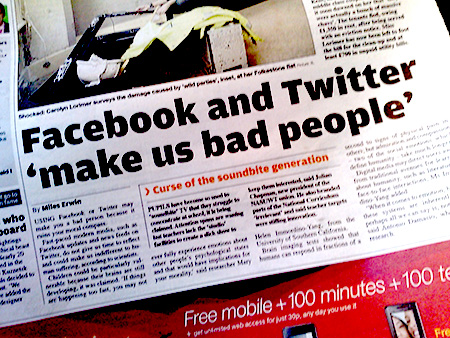Oscar Wilde has famously said, “Society exists only as a mental concept; in the real world there are only individuals.” That sounds like a thought that Facebook founder Mark Zuckerberg should lose some sleep over. Right?
Hardly.
The world is drunk. It is drunk on Mark Zuckerberg’s newfound formula for societal domination. Initially, Facebook was a place to share photos and thoughts with friends and family, and maybe play a few silly games that let you pretend you were a mafia don or a virtual farmer.
Soon, everyone had a ‘profile’. Your evil colleague whom you couldn’t stand, your mother who wanted to keep an eye on you, your sister’s best friend’s brother’s wife—they were all your ‘friends’ on Facebook. Very quickly, it became a social haven for those who liked and believed in a romanticised idea of friendship and social life; one that I believe can only exist in a Utopian world.

Basic codes of conduct are now fast fading into oblivion as a new kind of social tradition evolves; one that is blatantly self-centered.
Just last week, a status update from a friend of mine got me thinking. Here was this girl, with 745 ‘friends’ to brag about, disparaging the very idea of friendship. She published a post proclaiming friendship to be overrated and that 700-odd ‘friends’ on Facebook could do nothing to change that thought. After exploring the topic a bit more, I learned that she had jumped on the Facebook bandwagon with much excitement. She had connected with a few dozen people, commented about things on their Walls, and covered her page with interesting videos, links, photos, music, and other things that she wanted to share. Day after day, no one commented on her status. No one hit the ‘Like’ button to give her a ‘thumbs up’. No one said anything.
She felt a little dejected, but she persisted. She continued to engage with her ‘friends’, reading their status updates and wall posts and leaving positive comments, but after weeks of a one-sided relationship, she had finally had enough. She felt rejected and ignored. She said she had started to feel like the wallflower that she was during her school days, watching everyone else enjoying themselves.

Log in, tune out.
I share this story as a reminder that under the garb of this social obsession—almost fanaticism—lies an excuse for man, the otherwise ‘social animal’, to become covertly unsocial; in some cases, forcing lonely social animals to become lonelier. What the world has failed to acknowledge is that Facebook has wilted any social etiquette that had previously been hammered into our nascent minds. In all relationships, whether they be platonic, romantic, or business, a healthy dose of give and take is essential. If someone engages with you, you should have the courtesy to reciprocate. Even these basic codes of social conduct are fast fading into oblivion as a new kind of social tradition evolves; one that is blatantly self-centered. Perhaps, therein lies the advantage of interacting on Facebook—the option to be completely self-serving. The choice that we make in not reciprocating, while at the same time trampling upon the feelings of our ‘friends’; the advantage of ‘appearing offline’; the benefit of ‘ignoring’ a ‘friend request’ or ‘accidentally’ deleting a potentially controversial comment is a choice that we get to make only on Facebook.
Author Emily Post once said, “Sensitive awareness of the reactions of others is a priceless gift. Inexcusably, many of us do not even note the effect that our unthinking speech or behavior is quite plainly having upon the feelings of others.” Even though I agree with Oscar Wilde’s assessment to some extent, I sometimes wonder about what his opinion would be on society in today’s virtual world.








